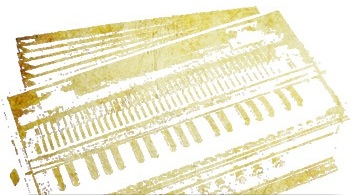



 |

Kirtan+ConfettiMusic and Mantra playlists |
 |

Learn harmonium!Online music classes |
 |

Krishna Das
|








 |

Kirtan+ConfettiMusic and Mantra playlists |
 |

Learn harmonium!Online music classes |
 |

Krishna Das
|
 posted by Daniel on December 9th, 2010
posted by Daniel on December 9th, 2010Is perfect pitch a rare musical gift, an elevated state of acoustical awareness possessed by few? Or is it a random neurological condition, creating a disposition towards pitch-OCD that may be musically disabling? Let's take a moment to de-mystify the cult of perfect pitch, and re-clarify what *is* important to develop along your musical journey.
A "Perfect Pitch Ear-Training Course" is being advertised to me through an ad next to the results of my Google search. Clearly, this catch phrase is an attractive one - and the promise of gaining the holy grail of perfect pitch is alluring enough for the folks marketing this ear-training course to dangle it like a golden carrot. Mozart had perfect pitch, they might tell me, and now so can I!
What is commonly known about people with perfect pitch, is that they have a remarkable ability to name notes out of context. If you sing a random note to them, they (if they've been trained in musical language) can tell you that it was a C#. You might not have known you were singing a C#, so this seems impressive. You go to the piano and check, and indeed, it's a C#. How did they do that?
For people with perfect pitch, the experience of various pitches is extremely distinct. Just as blue is distinct from green, and though both are colors, would never be confused for each other, for those with perfect pitch, C and C# are clearly distinct in their perceptual experience of the notes. It might even be baffling to them why the rest of us can't identify notes by their pitch alone. After all, do you need to look at a color chart to determine that a color you just saw was blue? So, why do you need to check a piano or other instrument to determine what note was just sung?
Alas, to the rest of us non-perfect-pitchers, the difference between C and C# is only revealed when played in comparison to one another. Play both notes to me, in sequence, and I'll tell you which is C#, because it's the higher one. This facility is called "relative pitch," and is a skill musicians develop over time. If we sing Indian music, where a drone is always emphasizing a primary note ("Sa"), then as we learn to sing scales and melodies, we can find the other notes of the scale ("Re," "Ga," and so on) simply *in reference to* the Sa being played as a drone. This is a very important skill, which is developed through practice, and eventually enables one to sing intricate melodies and improvisations that resonate beautifully with the drones, or other instruments, that are playing along. This is "relative pitch," where one is sensitive to the perception of one pitch in comparison to another ~ your voice's pitch in comparison to your harmonium, or your voice's pitch in comparison to the rest of the choir, or the note you are currently singing in comparison with that really high note you are about to leap to.
But folks with perfect pitch, perhaps better called "absolute pitch," have a strong sense of the absolute pitch of a note, or piece of music. For example, if you take a beloved childhood song often played in the key of C, which happens to start on a C note... and then have a musician play it to you in the key of C#, starting on the C# note: most of us won't be able to tell the difference. Same song, same melodic contour, just ever-so-slightly higher. For those with perfect pitch, however, the song is now utterly different. This may be jarring, or disorienting, or at least will sound "wrong." For them, each key seems qualitatively different, each possessing its own "flavor" or "feel," its own character. Many with absolute pitch compare it to color - they "hear" G-sharpness as instantly and clearly as we "see" blue.
There are certainly advantages to a musician being equipped with perfect pitch: tuning ones instrument without an electric tuner is easy, singing or notating any music at its "correct" pitch is easier, and each key gets enhanced by a unique color or qualitative distinctness. However, an over-awareness of the absolute pitch of sounds may actually impede experiencing *music.* It is not uncommon for stringed instruments such as guitars to be slightly de-tuned from tuning standards. As long as the guitar's strings are *relatively* in tune, meaning in tune with each other, then the guitar sounds fine to us, even if it's A string is tuned to 436 hertz instead of the modern standard of 440 hertz. But not to a person with absolute pitch! To them, music played on such a de-tuned guitar may sound mangled, painful, or distressing.
Additionally, in many musical cultures, transposing songs readily from one key to another is important. If a singer happens to have a higher voice, a skilled pianist accompanying her will simply play the song in a higher key. If my voice is not yet warmed up, I might begin a kirtan by playing a chant in the key of B instead of C#: slightly lower, to suit my voice. This shifting of keys may be disorienting and distressing for those with absolute pitch, and so this musical skill of transposition will be harder for them to acquire.
The wonder of harmony is that when multiple pitches are played together, they create an emotional effect on the listener and musician. As chords flow through a song, different groupings of notes push and pull our emotions, allowing us to access hidden and unspeakable realms of feeling. In an extreme case, a person with too strong a perception of absolute pitch will be focused on the "C-ness" of the C note, and the "E-flatness" of the E-flat note, and may fail to fully be moved by the emotional effect of the two notes relationship: a minor third, often called a "sad" interval by those whose focus is on relative pitch.
Absolute pitch is not necessarily of much importance to musicians – Mozart had it, but Wagner and Schumann lacked it. But if not through musical genius or talent, where does absolute pitch come from? How is it developed? What causes it? In his book "Musicophilia," neurologist Oliver Sacks reveals that incidence of absolute pitch is far higher in Chinese children (60%) than for American children (14%). He suggests that children learning a tonal language (like Mandarin or Cantonese, in which the same syllable spoken at different pitches has different meanings) are encouraged from early on to focus on pitch distinctions. Where-as a child born into an English-speaking family is initially bombarded by huge volumes of auditory information, from which it learns to select the elements that are meaningful in the English language. Early on, the brain recognizes that absolute pitch has little purpose in determining what words are being spoken, and so the brain scratches pitch off the list of auditory phenomena to focus on.
| [see permalink] |